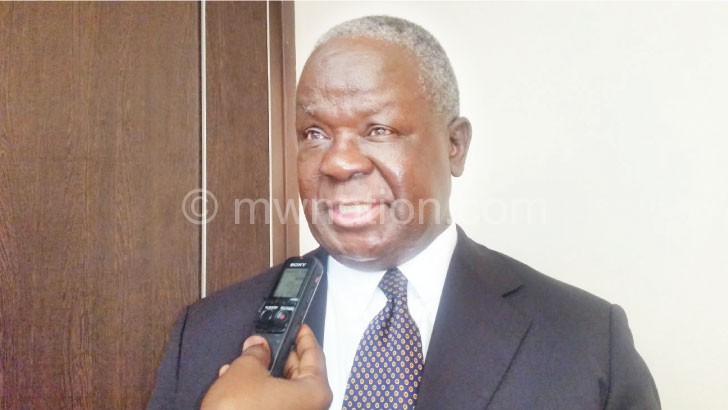Experts fault IFMIS roll-out delays
Experts have faulted delays to roll out in full the new Integrated Financial Management Information System (Ifmis), saying it reflects badly on government’s commitment to strengthen public finance management.
The experts, who are interested in budget tracking for transparency and accountability of public resources,
were reacting to Minister of Finance Felix Mlusu’s admission on Friday that full roll-out of the new electronic payment platform has delayed due to inadequate end-user training and network glitches.
Delivering his Mid-Year Budget Review Statement in Parliament in Lilongwe on Friday, Mlusu said Ifmis went live on July 1 2020 on a pilot basis with four key modules and 10 votes covered.
But he said due to inadequate end-user training and network problems, full roll-out has delayed, leaving all other government ministries, departments and agencies (MDAs) on the old platform riddled with operational
challenges. Mlusu said: “Going forward, government will roll out new Ifmis to all MDAs which will also follow the implementation of the Treasury Single Account [TSA] to significantly reduce the number of government bank accounts for easy management and control.”

But in his reaction in an interview yesterday, Information and Communications Technology (ICT) Association of Malawi president Bram Fudzulani yesterday wondered why there were challenges with end-user training considering that procurement and installation of the new Ifmis started during the 2018/2019 financial year.
He said such challenges could have been minimal because the new Ifmis seems to have been on the pilot phase for a long period, thereby exposing government to the old system which was faulted for having loopholes.
Fudzulani said the delayed full roll out reflected badly on the management of the Ifmis project.
On the network problem reportedly hampering implementation, he described it as a serious capacity issue within the Department of E-government, which manages the Government Wide Area Network (Gwan) on which the Ifmis system runs.
Fudzulani said: “We need to build capacity in this department for them to be able to support government systems. We cannot be complaining of network problems when we have government fiber backbone from Nsanje to Chitipa.
“This is why we have been asking government to regard ICT as an enabler not just on paper, but in its policy implementation in making sure that ICT is not a mere support unit.”
He said keeping ICT systems working and ensuring that maximum value is derived requires specific skills and experience; hence, the need to build human capacity in the Department of E-government
University of Malawi Chancellor College economics professor Ben Kaluwa said yesterday that government should take the training of new Ifmis end-users seriously by making it work within a reasonable time-frame.
He said apart from demand for accountability of public resources locally, the new Ifmis will be crucial to accountability of donor funds and restoration of lost confidence in public finance management systems.
Kaluwa said: “We are worried about the lack of transparency and accountability in public resource management when actually the new Ifmis could have changed things. For instance, the recent Covid-19 funds abuse could have easily been accounted for if everything was automated in the new Ifmis.”
But in an interview yesterday, Ministry of Finance spokesperson Williams Banda said the training has been ongoing.
He said public gathering restrictions due to Covid-19 public health guidelines has reduced the number of participants per class to less than 50.
Banda said the number of users to be trained is “over 4 000” from various cadres such as Ifmis systems specialists, budget planners, accountants, economists, revenue experts and ICT personnel.
He said: “Each of these cadres have own specialities and modules to be covered. The training for revenue experts is different from that of accountants. It’s a complex and time-consuming training exercise.” Banda hinted that the Ifmis platform will be rolled out fully by July 1 2021.
But Institute of Chartered Accountants in Malawi (Icam) chief executive officer Francis Chinjoka Gondwe, in an interview yesterday, said a system is as good as the people who operate it; hence, called for discipline among end-users.
He said: “The people operating the system should be of high ethical behaviour. For accountants
they should be members of Icam who can be disciplined when they manipulate the system.”
Gondwe said that for Icam to step in, government should register all its accountants to be subjected o disciplinary measures.
On his part, Human Rights Defenders Coalition (HRDC) chairperson Gift Trapence called for enhanced training of Ifmis end users for quicker implementation.
He observed that initially, officers were trained; hence, the government has no excuse not to roll out the new Ifmis fully.
The new system is touted to have the potential to seal loopholes in public finance management exposed in 2013 through revelations of Cashgate, the plunder of resources at Capital Hill.
In 2018, the Malawi Government awarded a tender to supply Ifmis software to Zimbabwe-based Twenty First Century at a bid price of $13.8 million (about K10 billion).
The new Ifmis replaces the old version of the software Epicor 7.3, which was due for upgrading since it was installed in 2005.
In August 2020, after rolling out the new Ifmis system, Accountant General Sungani Mandala said the new Ifmis will automate government financial transactions.
He said the new Ifmis has “strong security features that makes theft of public resources almost impossible”.
The system also introduces the automation of employee loan management that will enable recording and management of loans, which is currently done manually and that every month after deductions are effected, the loan record will be updated automatically.
Findings by British forensic auditor Baker Tilly in 2013 established that the old Ifmis was grossly abused, especially by lower management accountants in the civil service, resulting in the plunder of K24 billion over a randomly chosen six-month period between April and September that year






One Comment